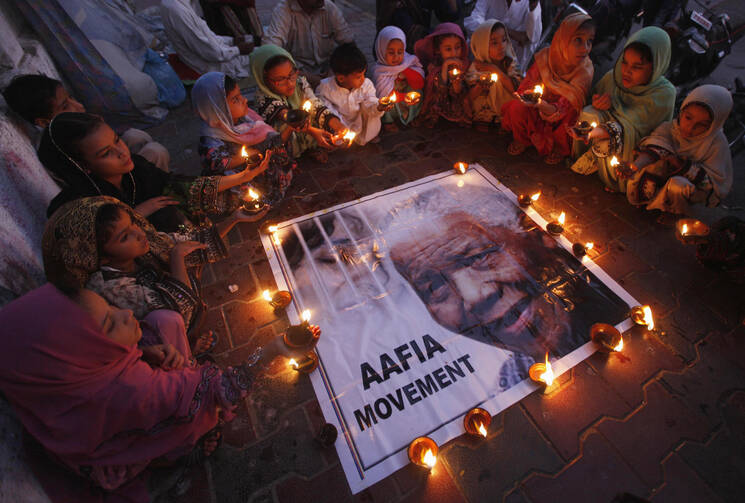As South Africans prepared to bury Nelson Mandela on December 6, tributes from around the world began pouring in, acclaiming a man who brought South Africa back from the brink of revolution and through a slow, sometimes painful process of reconciliation—one that is in many ways ongoing. South Africa Archbishop Stephen Brislin said he learned of Mandela’s death with “a mixture of sadness and of relief” that the president’s sufferings were over.
Describing the remarkable achievements of a historic leader of the struggle against apartheid and the first president of democratic South Africa, Archbishop Brislin, president of the Southern African Catholic Bishops’ conference, said the nation owed a huge debt to Mandela. “If it wasn’t for Mandela, I don’t know what would have happened to this country because we were certainly on the brink of civil war,” he said. “He stood up to people, very angry” over the repression of apartheid rule, people “who didn’t see the point of a negotiated settlement…. and it must have taken enormous courage.”
According to the archbishop one of the “most remarkable things” about Mandela was that “he was never bitter” despite his long imprisonment. He said history would have taken a very different turn if Mandela “had allowed anger and hatred to rule his life.”
In a condolence message to Nelson Mandela’s family, Archbishop Brislin wrote that Mandela, who died on Dec. 5 at the age of 95, “never compromised on his principles and vision for a democratic and just South Africa where all have equal opportunities, even at the great cost to his own freedom.
“The greatest way we can acknowledge the life of Nelson Mandela is to strive for the ideals he cherished: freedom, equality and democracy, and to defend these ideals from those who would corrupt them.”
In a telegram of condolences to South Africa's President Jacob Zuma, Pope Francis wrote, “It was with sadness that I learned of the death of former President Nelson Mandela, and I send prayerful condolences to all the Mandela family, to the members of the Government and to all the people of South Africa. In commending the soul of the deceased to the infinite mercy of Almighty God, I ask the Lord to console and strengthen all who mourn his loss. Paying tribute to the steadfast commitment shown by Nelson Mandela in promoting the human dignity of all the nation’s citizens and in forging a new South Africa built on the firm foundations of non-violence, reconciliation and truth, I pray that the late president’s example will inspire generations of South Africans to put justice and the common good at the forefront of their political aspirations. With these sentiments, I invoke upon all the people of South Africa divine gifts of peace and prosperity.”
Retired Anglican Archbishop Desmond Tutu lauded his fellow Nobel laureate as a man who showed a deeply divided nation how to come together. He downplayed rumors that South Africa would "go up in flames" in the wake of Mandela's death, saying such talk discredits South Africans' and Mandela's legacy."The sun will rise tomorrow, and the next day and the next,” he said. “It may not appear as bright as yesterday, but life will carry on."
Louisville Archbishop Joseph E. Kurtz, president of the U.S. Conference of Catholic Bishops, said the death of Nelson Mandela marked the passing of an era and an icon. “Christians, people of faith and all people of good will mourn the news of Nelson Mandela’s death.…In his struggle against apartheid rule, Nelson Mandela was a light for peace and equality in his country and for the whole world. His years of imprisonment exemplified the suffering experienced by so many who seek justice. As president of South Africa, Mandela sought to undo the structures that marginalized and impoverished people—work Pope Francis is now challenging the entire world to imitate.”
U.S. Secretary of State John Kerry in a statement said that Mandela “was a stranger to hate.”
“He rejected recrimination in favor of reconciliation and knew the future demands we move beyond the past," Kerry said. "He gave everything he had to heal his country and lead it back into the community of nations, including insisting on relinquishing his office and ensuring there would be a peaceful transfer of power. Today, people all around the world who yearn for democracy look to Mandela's nation and its democratic constitution as a hopeful example of what is possible.”
In a statement released today, New York Cardinal Timothy Dolan said: “Nelson Mandela was a hero to the world. His bravery in defending human rights against the great evil of apartheid made him a symbol of courage and dignity, as well as an inspiration to people everywhere. As Blessed Pope John Paul II noted during his visit to South Africa in 1995, Nelson Mandela was for many years, ‘a silent and suffering ‘witness” of your people’s yearning for true liberation,’ who, as President of South Africa, had to then ‘shoulder the burden of inspiring and challenging everyone to succeed in the task of national reconciliation and reconstruction.’ In succeeding in these crucial and difficult tasks, Nelson Mandela truly made the world a better place."








